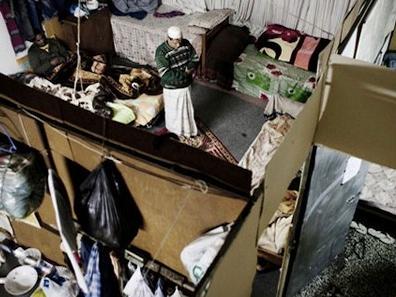In Greece, anti-immigrant mood rises during economic crisis
Photo of an immigrant in Greece (Image by Nikos Pilos)
On a recent Sunday morning, African immigrants pack the Faith Apostolic Church in central Athens. The church is a haven for 37-year-old Harry Sunday Ibanga from Nigeria. He moved to Athens seven years ago, just before the Olympics, when Greece hired many immigrants to work as cheap labor for construction.
"That time it was okay to find job in Greece," Ibanga said. "But these days it's very hard."
Ibanga lost his construction job a couple of years ago, when the economic downturn began. That's when he began to notice that Greeks stopped being so friendly. When he rode the bus to job interviews, he said he heard people saying that migrants like him only come to Greece to steal from Greeks.
"We don't come here to rob or steal," Ibanga said. "We come here to make our money and go back to our country and do something for our lives. But when they see us, they think that we are thieves."
One reason for the rising anti-immigrant sentiment is economic. Competition for jobs is fierce now. Greece's unemployment rate stands at more than 16 percent and youth unemployment runs almost three times that amount.
And if you lose your job in Greece, you don't have a safety net, said Panos Tsakloglou, who teaches economics at the Athens University of Economics and Business.
"Greece is one of the few countries in the European Union that does not have an income guarantee scheme," Tsakloglou said. "After the exhaustion of your unemployment benefits, it may be a free fall."
Many Greeks feel like they're in free fall now, and that's why they're outside parliament every day, shouting that their politicians are thieves.
Yiannis Aktimonas, a 42-year-old writer, said the government's austerity measures are killing the economy.
"I think that they're selling out the country," he said.
Aktimonas said he feels for immigrants, many of whom are homeless and living hand-to-mouth. But other Greeks say desperate migrants are turning to crime. Police in Athens say there's been a rise in muggings and stabbings, and migrants are partly to blame.
The increase in violent crime has stoked anti-immigrant anger in some Greeks, who feel abandoned by their government. They've been singing the national anthem at rallies, and saying that Greece belongs to the Greeks. Right-wing gangs have attacked migrants in central Athens, not far from Faith Apostolic Church.
On Sunday, the neighborhood around the church was tense but quiet. The Greeks I spoke to here refused to be recorded, but they said were scared that violence might flare again.
Shortly after the church service, a young Nigerian named Loki showed up outside. He said that Greek people don't want him in Athens, but he has no choice but to stay.
"I just came here to make some money," Loki said. "I don't have family. I'm all alone so if I can get work to sustain myself and be like others, I'll be very happy."
Loki said he was waiting for a friend who told him about a job. But the friend didn't show up.
An hour later, Loki picked up his knapsack and headed for the apartment he shares with ten other men. He said he's almost out of savings. He hopes he can find a job tomorrow.
——————————————————————————-
PRI's "The World" is a one-hour, weekday radio news magazine offering a mix of news, features, interviews, and music from around the globe. "The World" is a co-production of the BBC World Service, PRI and WGBH Boston. More about The World.
